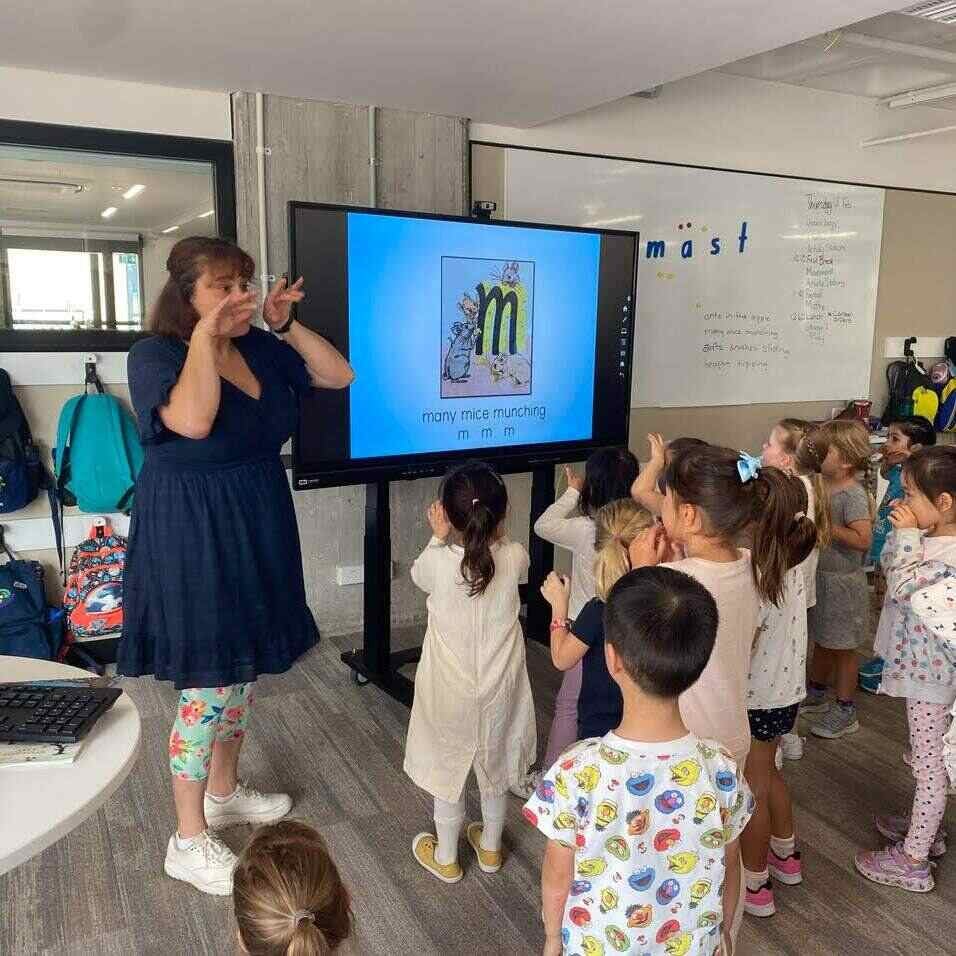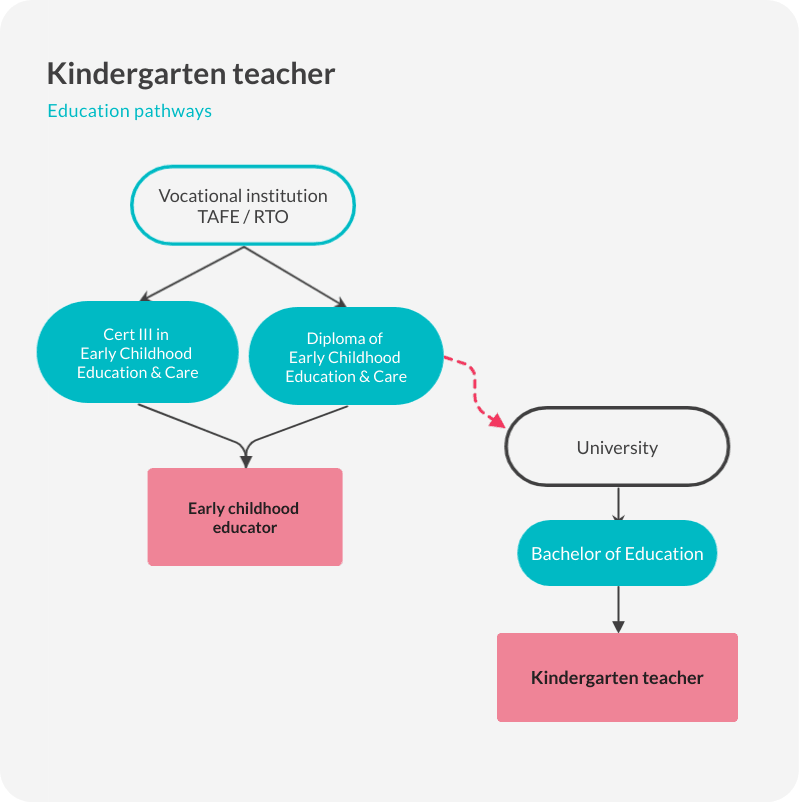How to Become a Kindergarten Teacher in Australia

Kindergarten teachers really do make a difference. During a crucial time in young children’s growth and development, they act as nurturers and trusted guides.
What does a kindergarten teacher do?
Before children start school and dive into a significantly more structured time of their lives, they need the opportunity to develop key skills, responses and behaviours. As a kindergarten teacher or early childhood educator, you’ll play an essential role in this development.
Through play, you will help children to use their imaginations. You’ll support them to grow and guide them through social, cognitive and emotional challenges. By identifying and helping kids through potential setbacks or difficulties, you will be setting them up to be more resilient and well-rounded when they enter their schooling years.

Maria Simpson
Educator, Lindfield Learning Village
According to Maria, kindergarten students are “less fearful of failure and will give everything a go.”
As a teacher, you should “want to foster this characteristic so that they will hold onto this growth mindset and carry it forward in their learning journey.”
Some common daily responsibilities for kindergarten teachers are:
Most importantly, Maria says that kindergarten teachers get to be “very creative with (their) approach to teaching and content that (they) can explore play-based learning approaches”.
Kindergarten teachers vs early childhood educators
Although both roles are responsible for the care, safety and development of younger children, the difference between being a kindergarten teacher and an early childhood educator is important.
Kindergarten teachers must have an undergraduate degree in Education, specialising in early childhood teaching. They work in registered kindergartens and lead the planning and implementation of programs aiming to develop children’s learning and social development.
Early childhood educators generally have at least a Certificate III qualification that enables them to work with children in care facilities, supporting their social skills and cognitive development.
What are the prospects for kindergarten teacher jobs?
Kindergarten teaching is a growing field. It’s projected to be one of the most in-demand professions in Australia by 2024. Job growth within the early childhood education industry specifically is estimated to rise by 16% by 2024.
So pursuing a teaching qualification will most likely lead to a stable and financially viable career.
Plus, if you work in a public school, you’ll have the summer holidays off.
Kindergarten teacher salary
Full-time kindergarten teachers can expect an average salary of:
| Level of experience | Average pay |
|---|---|
| Entry-level | $64,000 |
| Average (median) | $76,323 |
| Experienced | $93,259 |
Currently, kindergarten teachers make up approximately 25.3% of the early childhood education workforce. However, this number is projected to rise due to the growing demand for Bachelor’s degree-qualified early childhood teachers.
A study about Upskilling in Early Childhood Education conducted by the FutureTracks Organisation highlights Australia’s need to raise the quality of early learning centres and programs. To help achieve this, Australia must encourage more Diploma and Certificate holders to upskill into fully qualified teachers.
Victoria’s free kinder initiative
Demand for qualified kindergarten teachers is particularly strong in Victoria due to the free three- and four-year-old kinder initiative. The State Government has made all three- and four-year-old kinder programs free for eligible children through allocating more funding towards early childhood development in the 2020/2021 State Budget.
This has resulted in a rising number of enrolled children — and increased demand for qualified teachers.
What key skills do you need?
If you’re already working in some form of childcare or even a completely unrelated field, there’s a good chance you already have some of the foundational skills needed to become a successful kindergarten teacher.
These skills include:
As a kindergarten teacher, you will work with hundreds of kids throughout your career. As Maria points out, you will be “managing a range of developmental ages and breadth of abilities and ages in one class”.
As exciting as this can be, it is also why kindergarten teachers need to be so dynamic in their skill set.
“You will want to motivate the beginners while also stretching students who need extension.”
Skills you will need to develop
To flourish as a kindergarten teacher, you will need these critical skills:
Teamwork is particularly important to Maria, identifying her “team of seven amazing K-2 educators” as the reason they can “enhance the building of our Lindfield Learning Village Learning Characteristics of empathy, self-awareness, creativity, resilience and collaborative skills”.
According to the Australian Industry and Skills Committee, critical skills gaps in the current workforce need to be minimised in the next generation of qualified kindergarten teachers. These include:
Using computer applications
Communication skills
Communication is vital to more sensitively and better engage with families and colleagues under particular stressors.
Business skills
Business skills are particularly important for Family Day Care educators who need to understand the liabilities and responsibilities, including risk management, of running a small business.
Reflection
Reflective practice has been particularly singled out in recent years as it has been proven to help teachers better help their students achieve advanced development and learning.
How to become a kindergarten teacher
Whether you want to jump straight into a teaching career as a fully qualified kindergarten teacher or start in early childhood education, there are many pathways to choose from.
Complete a Bachelor of Education
To become a qualified kindergarten teacher in Australia, you must complete a teaching degree, such as a Bachelor of Education or an equivalent. This qualification usually takes 3-4 years of full-time study to complete and will include work placement to ensure you receive some practical training before graduating. Course delivery differs across universities, so check each university’s enrolment requirements and see which study options are available. Explore Bachelor of Education Courses.
Become a registered teacher
Once qualified, you’ll need to register with your registered state authority.
- VIC – Victorian Institute of Teaching (VIT)
- SA – Teachers Registration Board of South Australia
- TAS – Teachers Registration Board of Tasmania
- ACT – Australian Capital Territory – Teacher Quality Institute
- NSW – New South Wales – NSW Education Standards Authority
- NT – Northern Territory – Teacher Registration Board of the Northern Territory
- QLD – Queensland – Queensland College of Teachers
- WA – Western Australia – Teacher Registration Board of Western Australia
Early childhood education pathway
If you’re not sure if you want to commit to the degree straight away, a great first step is moving into early childhood education and care. You have the option to use your Certificate or Diploma as building blocks toward a degree later on.
There are multiple government-funded VET qualifications available, including pathways tailored to special education training.
Two of the most popular Early Childhood Education qualifications are:
Certificate III in Early Childhood Education and Care
Completing a Cert. III qualification will enable you to work as a childcare or education assistant within kindergartens, schools and daycares.
Explore Cert III Courses
Diploma of Early Childhood Education and Care
Completing a relevant Diploma qualification will enable you to find work as an education program support leader or officer, early learning centre manager or children’s service manager.
Explore Diploma Courses
If you already hold one or more of these qualifications, or if you’ve completed a high school finishing certificate, you are eligible to undertake a Bachelor’s qualification of early childhood learning.
Taking it further with postgraduate studies
If further study excites you, there are postgraduate study options available such as a Master’s Degree in teaching. A Master of Teaching lets you land more senior teaching jobs such as running your own early childhood learning centre or even working with older kids in primary schools.
If you’re ready to jump into this incredibly fulfilling career path, it’s time to take the next step! You could join people like Maria having a positive impact on young kids.
“Every day is a joy, and kindergarten students just want to learn. Their energy is contagious, and I go home feeling renewed each day.”
Ready to make this dream a reality? Scroll down for a range of nationally recognised education providers at your fingertips.



